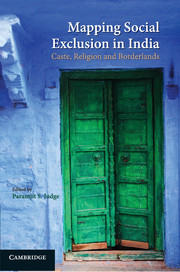Book contents
- Frontmatter
- Contents
- List of Tables and Figures
- Preface
- Introduction
- Part I Social Exclusion in India: Perspectives and Issues
- Part II Empirical Studies: Caste and Religious Exclusion
- 6 Egalitarian Religion and Caste-based Exclusion in Rural Punjab
- 7 ‘Rajput’, Local Deities and Discrimination: Tracing Caste Formation in Jammu
- 8 Excluded and Marginalized: Patterns of Deprivation of the Scavengers
- 9 Looking Beyond Generalities: Caste, Social Exclusion and Deras in Punjab
- 10 Caste and Dynamics of Inclusion and Exclusion in Local Governance
- Part III Case Studies: borderlands and Social Exclusion
- Conclusion
- Contributors
- Index
10 - Caste and Dynamics of Inclusion and Exclusion in Local Governance
from Part II - Empirical Studies: Caste and Religious Exclusion
Published online by Cambridge University Press: 05 April 2014
- Frontmatter
- Contents
- List of Tables and Figures
- Preface
- Introduction
- Part I Social Exclusion in India: Perspectives and Issues
- Part II Empirical Studies: Caste and Religious Exclusion
- 6 Egalitarian Religion and Caste-based Exclusion in Rural Punjab
- 7 ‘Rajput’, Local Deities and Discrimination: Tracing Caste Formation in Jammu
- 8 Excluded and Marginalized: Patterns of Deprivation of the Scavengers
- 9 Looking Beyond Generalities: Caste, Social Exclusion and Deras in Punjab
- 10 Caste and Dynamics of Inclusion and Exclusion in Local Governance
- Part III Case Studies: borderlands and Social Exclusion
- Conclusion
- Contributors
- Index
Summary
Panchayati Raj Institutions (PRI) are vital for self-governance at the grass-root level and provide an ideal forum for decentralized planning and implementation for development work in accordance with people's needs and aspirations. With this assumption, the government of India made the 73rd constitutional amendment in December, 1992. An important radical measure underlying this legislation is regarding reservation for women, Scheduled Castes (SC), and Scheduled Tribes (ST), not only in membership but also in positions of authority such as sarpanches or pradhans. It was expected that the new amendment would usher in an era of egalitarian society in place of the present unequal, stratified, and hierarchical one. The main focus of this chapter is to address the question of empowerment of the scheduled castes and women.
The constitutional amendments (73rd and 74th Acts) were viewed as powerful instruments of social change in the country. The two Acts were all about distribution of power. However, it was not realistic to expect that a silent revolution would make sweeping changes to our traditionally hierarchical society. Predictably, the revolutionary potential was to face stiff opposition from powerful and dominant social forces. Thus, over the major part of the last two decades, rural India witnessed social conflicts ofvarious degrees and dimensions because the traditional power holders targeted the weaker sections to undermine the authority bestowed on them by the two amendments to the Constitution (Baviskar and Mathew 2009).
Information
- Type
- Chapter
- Information
- Mapping Social Exclusion in IndiaCaste, Religion and Borderlands, pp. 192 - 214Publisher: Cambridge University PressPrint publication year: 2014
